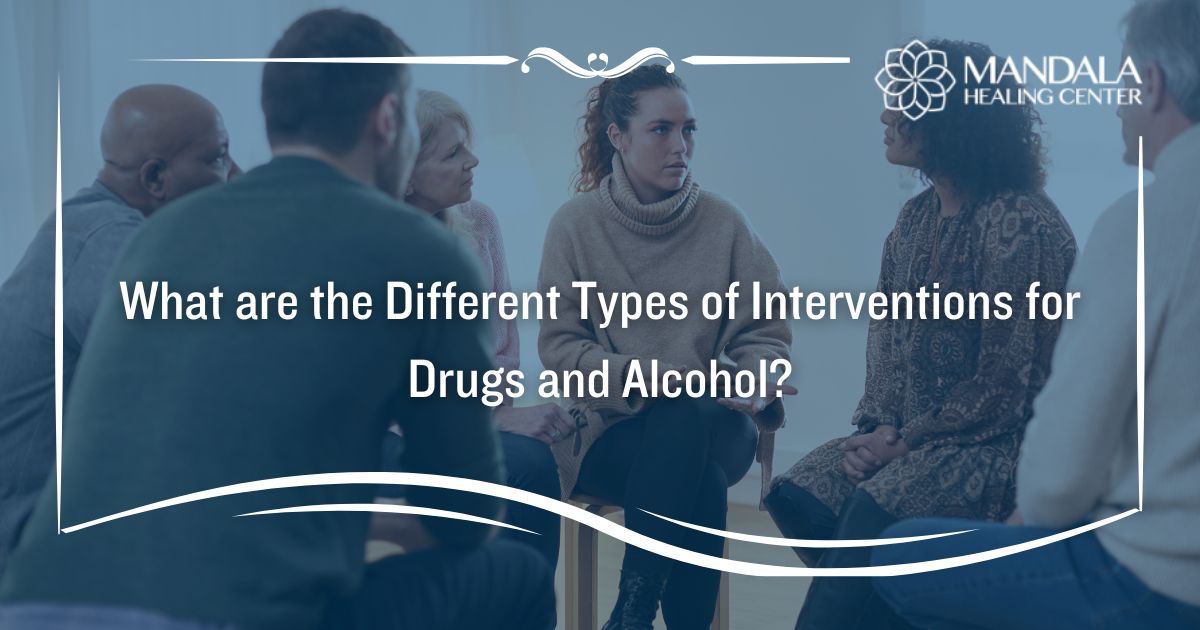According to the Substance Abuse and Mental Health Services Administration (SAMHSA), 48.7 million people struggled with a substance use disorder in 2022.[1]
Dealing with drug addiction and alcoholism is tough, even if you’re not the one struggling with substance abuse. These conditions can make loved ones feel anxious, scared, sad, and even ashamed. Watching someone you love struggle with addiction is never easy, especially if they are refusing to get help.
When your loved one is refusing to attend professional treatment, you might feel like your back is against the wall. Wondering what you can do to convince them to seek treatment is common.
While this is not a foolproof technique, the best way to assist a loved one who is avoiding treatment is to host an intervention. Interventions are like family meetings a professional facilitates to convince your loved one to get the help they need. Keeping this in mind, there are different types of interventions for drugs and alcohol to be aware of.
The main types of interventions for addiction include simple interventions, classic interventions, family system interventions, crisis interventions, and the Johnson Model of intervention. Since each person with substance abuse is unique, they use different methods to persuade someone to seek addiction treatment.
What are the Different Types of Interventions for Addiction?
If your loved one struggles with addiction, you’ve probably heard of an intervention before. Interventions are meetings where addicts’ loved ones read emotional statements to convince them to seek help.
While many people are familiar with the type of intervention shown in the media, there is more than one kind. Being aware of the different types of interventions for drugs and alcohol can help you determine what would work best for your loved one and their personality.
The main types of interventions for addiction include:
Simple Interventions
Simple interventions do not gather multiple family members of the addict to participate. Instead, they select the closest family member to the addicted person to read impact statements privately. This strategy works for people who don’t like crowded environments or feel defensive around their family members.
Classic Interventions
You may be familiar with classic interventions, as TV and the media often show them. In a traditional intervention, the addicted person’s loved ones gather to read impact statements in a formal setting. A professional facilitates them and plans them heavily.
Family System Interventions
Family system interventions focus on more than one problematic behavior within a family unit.
For example, let’s say your brother has an alcohol problem. Your mom is enabling him by giving him money, getting him out of jail, and supporting his bad actions.
During a family systems intervention, the facilitator would focus discussions on your brother’s and your mother’s behavior using problem-solving techniques. This strategy helps by not only focusing on the addicted person. It makes it easier for them to accept the information they hear.
Crisis Interventions
We use crisis interventions when the addicted individual is in direct danger in some manner. Maybe their behavior is posing a safety risk to themselves, such as experiencing frequent overdoses or getting into risky situations while high. Due to the impending danger, sensitive techniques are used to ensure the individual experiences short-term relief from their self-destructive behavior and to provide immediate safety.
The Johnson Model
The Johnson Model involves 7 components to make the intervention successful.
These components include:
- An intervention team of immediate family and close friends with easy-going personalities to avoid arguments and high emotions
- Careful planning to ensure that every aspect of the intervention is well thought out, including when it will take place to prevent the addicted individual from showing up in an altered state
- Ensuring the loved ones communicate compassionately and carefully to make sure the addicted individual feels cared for and loved, rather than attacked
- Writing letters in advance that are checked by the facilitator to make sure the correct language is used and judgments are not being passed
- Make sure everyone’s focus is on the addiction to avoid any stressors from the past being brought up
- Recovery is the primary goal, which means everyone needs to be acting with the hope that their loved one will accept treatment at the end of the intervention
- The facilitator will conduct research and create plans for treatment that begin immediately upon the intervention ends, offering 3 different options to make the addicted individual more likely to accept help
How to Know Which Type of Intervention is Best for Your Loved One
So many different types of interventions are available, so how do you know which one to use for your loved one?
The best way to determine what intervention strategy will work best for your addicted loved one is to work with a professional interventionist. These individuals can get to know your loved one and their personality, allowing them to make an informed decision on what techniques would work and which ones to avoid.
Get Connected to a Top-Rated Drug and Alcohol Rehab Center
If your loved one struggles with drug addiction or alcoholism, it’s time to consider professional help. Whether you are hosting an intervention or your loved one has agreed to treatment on their own, Mandala Healing Center is ready to support you with a variety of treatment options, including one-on-one therapy sessions and support groups.
Our treatment program offers long-term treatment for substance abuse problems and co-occurring mental illness. To learn more about our drug and alcohol treatment center or find intervention support, contact us today.
References:
The Substance Abuse and Mental Health Services Administration (SAMHSA): HHS, SAMHSA Release 2022 National Survey on Drug Use and Health Data, Retrieved January 2024 From https://www.samhsa.gov/newsroom/press-announcements/20231113/hhs-samhsa-release-2022-nsduh-data












